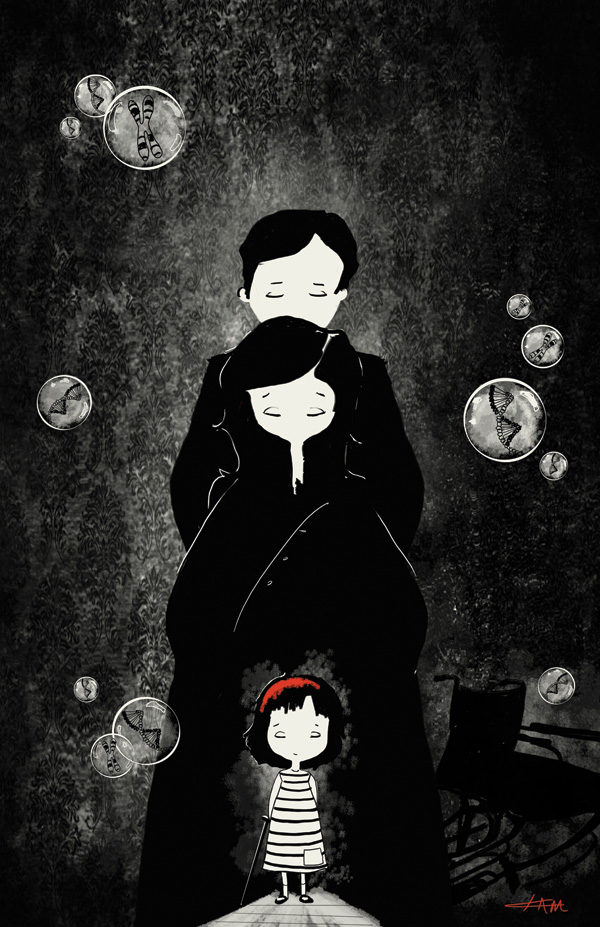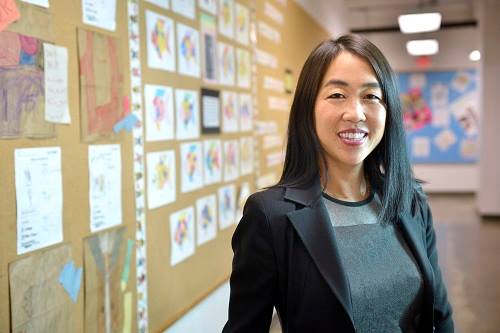story and illustration by KAM REDLAWSK
While genes alone aren’t the only building blocks to a person’s life narrative, they are a pretty good start, as they mark the beginnings to our story. Like so many other adoptees, my genetic history lives behind a closed door I have not yet been given a key to.
When I see children with their birth parents, or scroll through Facebook and see updates about new births, I can’t help but feel deeply enthralled by the idea of sheer physical resemblance of child to parent.
It to me feels almost magical, for it’s a biological link I never had the opportunity to experience or may ever experience.
As a 36-year-old adult, I, too, have a past. Except this past takes place in white suburbia with Midwestern elements: a large, church-going family; a father who liked to fix cars while listening to oldies music; fishing; baseball; youth soccer; pasta and potato salad; and a grandma who baked homemade pies. And yet, while I treasure the memories of my traditional American upbringing, I know this is not the only place I come from.
As a child new to America, I might as well have not had a past. For my adoptive family, my life “began” when I was 4 years old. Although I remembered how confusing it felt to be taken away from South Korea and my foster mom, the memories of my native land quickly dissipated. Most of us, of course, forget our early years, but most people also have a collection of people who can tell them what they were like during their earliest years. That’s not the case for me.
I have made casual efforts to connect with my blood family in Korea, such as traveling to Korea during college and returning with my Korean adoptee husband five years later to visit Daegu, the place of my birth. While I have visited my orphanage and met my foster mom, my search for birth family has always turned up empty.
Recently, through Korean adoptee Facebook pages, I learned about 23andMe, a genetic testing service that helps people explore their ancestry and family history. My husband and I each took the 23andMe test, and three weeks later, received an ancestry composition and a list of blood relatives. So far, I have had the chance to exchange emails with and even Skype with a couple of my fourth cousins in Korea.
A common thread I’ve noticed among the community of adoptees who belong to either the 23andMe or Korean adoptee Facebook group is that everyone seems to be searching for something, whether it’s themselves, family, or anything that can help clarify their identity.
Some adoptees become strong advocates for Korean adoptees, in terms of getting their voices heard. Some are searching for a connection, a bond that someone understands them. Others are trying to free themselves out from under the rubble of trauma and identity confusion. Then, there are adoptees like myself, who don’t harbor much anger or sadness about the past, but nonetheless have a curiosity about it.
While I’ve never struggled to feel a sense of belonging growing up, I can’t deny there has always been a thread of loneliness present throughout my entire life. Thus, I am in a perpetual state of searching. I may not find what I am looking for, but at least I know something is always waiting to be found.
___
Kam Redlawsk’s column runs every other month. To read more from Kam, visit greengreengrass.typepad.com or her official Facebook page.
![]()
This article was published in the April/May 2015 issue of KoreAm. Subscribe today! To purchase a single issue copy of the April/May issue, click the “Buy Now” button below. (U.S. customers only. Expect delivery in 5-7 business days).






